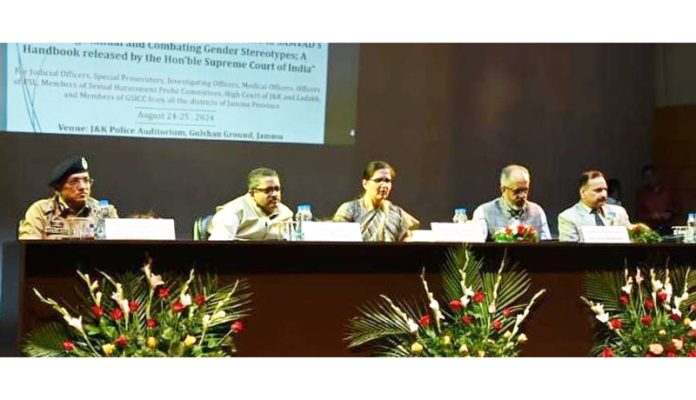
Excelsior Correspondent
JAMMU, Aug 24: Under the leadership of Justice Tashi Rabstan, Acting Chief Justice of the High Court of Jammu & Kashmir and Ladakh, and with guidance from the Chairperson and Members of the Governing Committee for the J&K Judicial Academy, a two-day sensitization program was organized by the J&K Judicial Academy.
The program, titled “POCSO Act and POSH Act with Special Reference to SAMVAD’s Training Manual and Combating Gender Stereotypes,” was held at the J&K Police Auditorium in Gulshan Ground.
The training programme was inaugurated by Justice Sindhu Sharma, Chairperson, Sexual Harassment Probe Committee in the presence of Justice Rajnesh Oswal, Justice Rahul Bharti, Member of the Governing Committee for J&K Judicial Academy and Anand Jain, ADGP, Jammu. Shiv Kumar DIG Jammu and Joginder Singh SSP Jammu also attended the inaugural session.
Delivering her inaugural address, Justice Sindhu Sharma, emphasized that there was a dire need of organizing such sensitization programmes to raise the awareness level of all the stake holders about the needs of the most vulnerable and marginalized sections of society and sensitivities involved while dealing with the victims of POCSO and POSH Act.
Justice Sindhu Sharma stressed upon the need of better implementation of the provisions of POCSO Act and POSH Act and added that Combating Gender Stereotypes; A Handbook released by the Supreme Court of India is a welcome gesture. Justice Sharma deliberated that Gender stereotypes perpetuate violence and discrimination, undermining the effectiveness of legal protections.
Justice Rahul Bharti gave various real-life illustrations and highlighted that incidents of sexual abuse against children do occur at schools, religious places, parks, hostels, etc and the security of children is not guaranteed anywhere. With such emerging dangers, it was significant to introduce a special legislation which could provide a reliable system for mitigating the number of such offences and punishing the perpetrators.
Justice Bharti said that POCSO Act has been instrumental in providing a robust justice mechanism for the victims of sexual abuse and has highlighted the significance of child rights and safety. His Lordship remarked that we need to be sensitive without actually told to be sensitized.
Anand Jain, ADGP, Jammu while delivering his keynote address urged that necessity of having the special legislation like POCSO Act to be underscored by alarming statistics.
According to the National Crime Records Bureau (NCRB), over 16,000 cases of child sexual abuse were reported in 2022 alone.
He said that POCSO Act is instrumental in addressing this crisis, providing a structured approach for justice and victim protection. He remarked that the effectiveness of the act continues to depend on robust implementation and adequate rehabilitation facilities.
Yash Paul Bourney, Director, J&K Judicial Academy welcomed the dignitaries, Resource Persons and participants.
He deliberated that the Protection of Children from Sexual Offences (POCSO) Act, 2012 makes provisions for avoiding the re-victimisation of the child at the hands of the legal system which provides for Special Courts to conduct the trial in-camera and without revealing the identity of the child, in a manner that is as child-friendly as possible.
On the first day, the first session was conducted by Sunil Sethi, Sr. Advocate, High Court of J&K and Ladakh who explained the objective, nature & contours of the POCSO Act.
The second session of the programme was chaired by Justice Rajnesh Oswal, Judge, High Court of J&K and Ladakh who gave a detailed overview of Framing of Charges in POCSO Trials including recording and appreciation of evidence of victims in cases of Child Sexual Abuse.
In the third session, Seema Khajuria Shekhar, Sr. Advocate. High Court of J&K and Ladakh deliberated that preferential treatment for men as opposed to women, because of their gender are known as gender discrimination and sexual harassment at the workplace is a result of such discrimination. Gender discrimination based on gendered biases and attitudes are a reality for many working/professional women and can occur in the workplace in one or more ways.
Sonia Gupta, PDJ Reasi conducted the proceedings of the two days sensitization programme.

